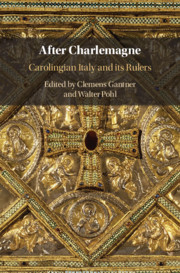Book contents
- After Charlemagne
- After Charlemagne
- Copyright page
- Contents
- Contributors
- Additional material
- 1 Italy after Charlemagne
- 2 A Brief Introduction to Italian Political History until 875
- Section I Was There a Carolingian Italy?
- Section II Organizing Italy
- Section III Carolingian Rulers
- Section IV Cities, Courts and Carolingians
- 12 A Byzantine Cuckoo in the Frankish Nest?
- 13 Urbanism as Politics in Ninth-Century Italy
- 14 Rome and the Others
- 15 Between the Palace, the School and the Forum
- Bibliography
- Index
15 - Between the Palace, the School and the Forum
Rhetoric and Court Culture in Late Lombard and Carolingian Italy
from Section IV - Cities, Courts and Carolingians
Published online by Cambridge University Press: 03 December 2020
- After Charlemagne
- After Charlemagne
- Copyright page
- Contents
- Contributors
- Additional material
- 1 Italy after Charlemagne
- 2 A Brief Introduction to Italian Political History until 875
- Section I Was There a Carolingian Italy?
- Section II Organizing Italy
- Section III Carolingian Rulers
- Section IV Cities, Courts and Carolingians
- 12 A Byzantine Cuckoo in the Frankish Nest?
- 13 Urbanism as Politics in Ninth-Century Italy
- 14 Rome and the Others
- 15 Between the Palace, the School and the Forum
- Bibliography
- Index
Summary
The role played by Lombard intellectuals in the early production of Charlemagne’s court is well known: the grammarian Peter of Pisa, the theologian Paulinus of Aquileia and the historian Paul the Deacon found favour with the Frankish king thanks to their literary talents. These men were the paragons of a Lombard palace culture and education rooted in the study of the Roman and late antique poets and in the mastery of the arts of speech. The analysis of the poems produced by Lombard scholars attending the Carolingian court and the examination of school miscellanies produced in late eighth- and ninth-century Italy highlight the distinctiveness of a culture in which epideictic literature and Ciceronian rhetoric featured prominently. This unveils the survival of an advanced education, the origins of which can be traced back to late antiquity and, more importantly, such a study brings out continuities in the literary culture of early medieval Italy. Here, a rhetorically elaborated and politically engaged production – written and oral – continued to be favoured in the centres and among the elites more closely connected to the court, thus showing that no cultural break was brought about by Charlemagne’s conquest of the Lombard kingdom.
Keywords
- Type
- Chapter
- Information
- After CharlemagneCarolingian Italy and its Rulers, pp. 250 - 274Publisher: Cambridge University PressPrint publication year: 2020

